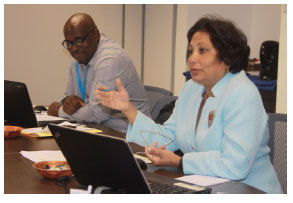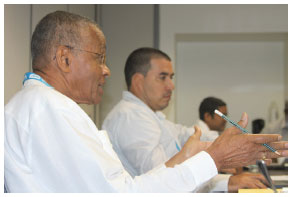
SYLLABUS UNDER REVIEW
 PRINCIPLES OF ACCOUNTS PRINCIPLES OF ACCOUNTS
At its meeting held in March 2016, the Review Committee reviewed all aspects of the syllabus, with the main aim of identifying the competencies, knowledge and attitudes that students might reasonably be expected to demonstrate. The committee also revisited the specific objectives to ensure that they adequately reflect the expected competencies, knowledge and attitudes of the students; revisited the content areas to ensure that they were current and relevant; and structured the School-Based Assessment (SBA) task to demonstrate and measure the common skills relevant to the world of business and captured in the group of subjects considered as Business Cognates; namely, Economics, Principles of Accounts, and Principles of Business.
The following is a summary of the actions taken:
(i) Revision and refinement of the General Objectives for all Sections.
(ii) Clarification and elaboration of Specific Objectives, and Content.
(iii) The revised syllabus comprises eleven sections, namely, Section 1, Accounting as a profession; Section 2, Accounting as a system; Section 3, Books of original entry; Section 4, Ledgers and the trial balance; Section 5, The preparation and analysis of financial statements of the sole-trader; Section 6, Accounting adjustments; Section 7, Control systems; Section 8, Accounting for partnerships; Section 9, Accounting for limited liability companies, cooporatives and non-profit organisations; Section 10, Manufacturing and inventory control; and Section 11, Accounting for the entrepreneur.
(iv) A list of Suggested Teaching and Learning Activities have been included in each section of the syllabus to help teachers cater to the different learning styles and to stimulate and maintain interest in the subject area.
(v) The School-Based Assessment will be a task which requires candidates to demonstrate competence in the skills and abilities identified in the syllabus as relevant to the field of business.
(vi) The SBA task will be so structured that a candidate sitting Principles of Accounts and any other cognate/s namely Economics and Principles of Business, will be able to submit one assignment and the awarded grade used for all the subjects.
(vii) The structure of Paper 02 has been changed to make it more psychometrically robust by eliminating the current options and giving five compulsory questions.
The draft syllabus was submitted to the April 2016 meeting of SUBSEC requesting approval to complete the revision of the syllabus. Approval was granted. The draft syllabus was sent to resource persons and other stakeholders for comments. A Panel meeting will be convened in January 2017 to complete the revision of the syllabus. The final draft of the syllabus along with the specimen examination papers, keys and mark schemes will be submitted to SUBSEC in April 2017, for approval. The approved syllabus and copies of the specimen examination papers, keys and mark schemes will be distributed to schools in May–June 2017, for first examination in May–June 2019.
PRINCIPLES OF BUSINESS
At its meeting held in March 2016, the Review Committee reviewed all aspects of the syllabus, with the main aim of identifying the competencies, knowledge and attitudes that students might reasonably be expected to demonstrate. The committee also revisited the specific objectives to ensure that they adequately reflect the expected competencies, knowledge and attitudes of the students; revisited the content areas to ensure that they were current and relevant; and structured the SBA task to demonstrate and measure the common skills relevant to the world of business and captured in the group of subjects considered as Business Cognates; namely, Economics, Principles of Accounts, and Principles of Business.
The following is a summary of the actions taken:
1. Revision and refinement of the General Objectives for all Sections.
2. Clarification and elaboration of Specific Objectives, and Content.
3. The revised syllabus comprises ten sections, namely, Section 1, The nature of business; Section 2, Internal organisational environment; Section 3, Establishing a business; Section 4, Legal aspects of business; Section 5, Production; Section 6, Marketing; Section 7, Logistics and supply chain; Section 8, Business finance; Section 9, Role of government in an economy; and Section 10, Technology and the global business environment.
4. The Sections are divided into three main categories namely Organisational principles, Sections 1-4; Promotion and logistics, Sections 4-7; and Finance, government and technology, Sections 8-10.
5. A list of Suggested Teaching and Learning Activities have been included in each section of the syllabus to help teachers cater to the different learning styles and to stimulate and maintain interest in the subject area.
6. The School-Based Assessment will be a task which requires candidates to demonstrate competence in the skills and abilities identified in the syllabus as relevant to the field of business.
7. The SBA task will be so structured that a candidate sitting Principles of Business and any other cognate/s namely Economics and Principles of Accounts, will be able to submit one assignment and the awarded grade used for all the subjects.
8. The structure of Paper 02 has been changed to make it more psychometrically robust by eliminating the current options and giving five compulsory questions.
The draft syllabus was submitted to the April 2016 meeting of SUBSEC requesting approval to complete the revision of the syllabus. Approval was granted. The draft syllabus was sent to resource persons and other stakeholders for comments. A Panel meeting will be convened in January 2017 to complete the revision of the syllabus. The final draft of the syllabus along with the specimen examination papers, keys and mark schemes will be submitted to SUBSEC in April 2017, for approval. The approved syllabus and copies of the specimen examination papers, keys and mark schemes will be distributed to schools in May–June 2017, for first examination in May–June 2019.
REVISED SYLLABUSES
 AGRICULTURAL SCIENCE AGRICULTURAL SCIENCE
The revised syllabus was approved by SUBSEC at its meeting in April 2016 and was released to schools in May–June 2016, for first examination in May–June 2018.
The Rationale and Aims were revised to reflect the attributes of the Ideal Caribbean Person, UNESCO Pillars of Learning and other areas for consideration based on the political, philosophical and psychological considerations for syllabus development. The General Objectives for all Sections were reviewed and refined. The Specific Objectives and Content/Explanatory Notes were clarified. In keeping with the directive of SUBSEC at its October 2014 meeting, the Double Award was retained into the final draft of the syllabus. The final draft of the syllabus therefore comprises six sections. Since the course of study as outlined in the Single Award will be pursued by all candidates who register for CSEC® Agricultural Science, it contains four sections namely Section A, Introduction to Agriculture; Section B, Crop Production; Section C, Animal Production; and Section D, The Business of Farming. Candidates pursuing the Double Award will complete two additional sections namely Section E, Crop and Animal Management Technologies, and Section F, Entrepreneurship and Communication. The revised CSEC® Agricultural Science Syllabus features Suggested Teaching and Learning Activities in all Sections in an effort to help teachers cater to the different learning styles and to stimulate and maintain interest in the subject area. The Glossary of Mathematical Terms and Resources were revised. A Glossary of Examination Terms can be found in this revised syllabus.
ECONOMICS
The Panel, at its meeting held in January 2016, revised all aspects of the syllabus, with the main aim of identifying the competencies, knowledge and attitudes that students might reasonably be expected to demonstrate. The committee also revisited the specific objectives to ensure that they adequately reflect the expected competencies, knowledge and attitudes of the students; revisited the content areas to ensure that they were current and relevant; and in keeping with the new SBA policy, structured the SBA task to demonstrate and measure the common skills relevant to the world of business and captured in the group of subjects considered as Business Cognates; namely, Economics, Principles of Accounts, and Principles of Business.
The following is a summary of the actions taken:
1. Revision and refinement of the General Objectives for all Sections.
2. Clarification and elaboration of Specific Objectives, and Content.
3. The revised syllabus comprises eight sections, sub-divided into specific objectives and corresponding content. Sections 1–4 are related to micro-economics and Sections 5–8 are related to macro-economics.
4. The eight Sections, are Section 1, The nature of economics; Section 2, Production, economic resources and resource allocation; Section 3, Demand and supply; Section 4, Market structure and market failure; Section 5, The financial sector; Section 6, Economic management: policies and goals; Section 7, International trade; and Section 8, Caribbean economies in a global environment.
5. A list of Suggested Teaching and Learning Activities have been included in each section of the syllabus to help teachers cater to the different learning styles and to stimulate and maintain interest in the subject area.
6. A Glossary of Economics terms as well as terms used in the Economics examination was included in the syllabus document and the list of resources was revised and updated.
7. The School-Based Assessment will be a task which requires candidates to demonstrate competence in the skills and abilities identified in the syllabus as relevant to the field of business.
8. The SBA task will be so structured that a candidate sitting Economics and any other cognate/s namely Principles of Business and Principles of Accounts, will be able to submit one assignment and the awarded grade used for all the subjects.
9. The structure of Paper 02 has been changed to make it more psychometrically robust by eliminating the current options and giving five compulsory questions.
The final draft of the syllabus along with the specimen examination papers, keys and mark schemes will be submitted to SUBSEC in April 2017, for approval. The approved syllabus and copies of the specimen examination papers, keys and mark schemes will be distributed to schools in May–June 2017, for first examination in May–June 2019.
|
![]()
![]()

![]()
![]()
